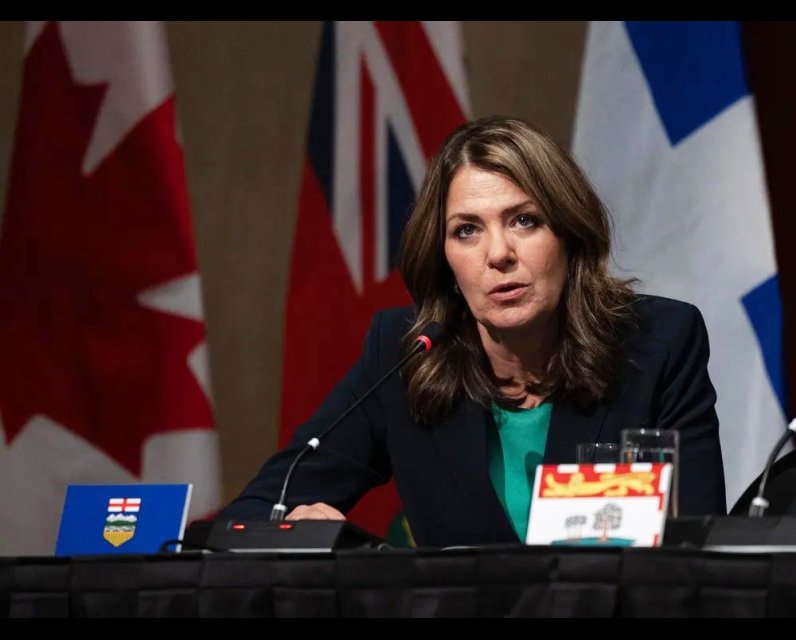Source Feed: National Post
Author: Rahim Mohamed
Publication Date: June 3, 2025 - 15:27
Alberta and Ottawa tout a grand bargain on 'decarbonized' oil but some are skeptical
June 3, 2025

OTTAWA — “Grand bargain” was the phrase of the day on Parliament Hill after Prime Minister Mark Carney and his provincial counterparts found common ground on oil and gas development.
“If (the Conservatives) were listening to yesterday, there is a grand bargain,” Energy Minister Tim Hodgson boasted to the Opposition benches.
“There is a bargain that the premier of Alberta has signed onto.”
Alberta Premier Danielle Smith left Monday’s first ministers’ meeting with a new deal exchanging oil sands access to coastal waters for massive investments in decarbonization technologies, but experts warn this could be a costly pipe dream.
“I’m worried we’re seeing (the first ministers) fall into a trap of wanting to have their cake and eat it too,” said Tim McMillan, a partner at Garrison Strategy and the former head of the Canadian Association of Petroleum Producers.
Smith said Monday evening
that she was encouraged
by the inclusion of language endorsing the movement of “decarbonized Canadian oil and gas by pipelines”
in the meeting communiqué
.
“Let’s call it the grand bargain,” Smith told reporters in Saskatoon, referring to the idea of twinning new pipeline proposals with large-scale decarbonization projects.
Carney said Monday that
he’d consider fast-tracking
a new oil pipeline to the West Coast if it shipped “decarbonized barrels” to new markets.
“There’s real potential there (and), if further developed, the federal government will look to advance it,” said Carney.
But McMillan says the devil could be in the details.
“I don’t know exactly what they’re talking about with decarbonization, but… it may be linked to carbon capture, which does not increase our exports (or) investability,” said McMillan.
“If (carbon capture) becomes a long-term requirement for new projects, it will likely have a negative effect on future investments in Canada’s upstream oil and gas sector.”
The
Calgary-based Pathways Alliance
, a group of six major oil sands producers, has put forward a $16.5-billion decarbonization network that would reroute carbon emissions from nearly two dozen facilities to an underground hub near Cold Lake, Alta.
The project has been at a
standstill for years over government funding
.
Smith said Monday that the financial windfall of a new West Coast bitumen pipeline serving markets in Asia could help make the economics of the Pathways project work.
“If we had a million barrel a day pipeline going to the northwest (British Columbia) coast, that would generate about $20 billion a year in revenues… that seems like a pretty good value proposition if both of those projects can proceed at once,” said Smith.
Carney and Hodgson have
both paid lip service
to the Pathways project in recent weeks, but the venture still faces an uphill battle.
A recent independent analysis found the project was
likely to lose money
due to the limited recyclability of captured carbon.
“Even under optimal conditions, the Pathways project may struggle to break even, and real-world operations are rarely optimal,” read the study, prepared by the Institute for Energy Economics and Financial Analysis.
“The Canadian federal government and the province of Alberta may be pressured to make up the likely shortfall,” it continued.
“An unprofitable carbon capture project will struggle to bring lasting positive economic benefits to host communities and become dependent on external financial subsidies to maintain operations.”
McMillan also noted that Canada’s two biggest competitors in the heavy oil industry, Mexico and Venezuela, are unlikely to follow suit with large-scale carbon capture projects of their own, giving each an edge over Canada on a per-barrel basis.
Pathways’ President Kendall Dilling said Tuesday he was excited by the developments over the past 24 hours.
“Pathways Alliance is encouraged by the work our federal and provincial governments have been advancing, most recently at the First Ministers’ meeting,” wrote Dilling in an email to the National Post.
“We’re ready to work together for Canada’s economic and energy future and provide input on how Canada can remove barriers and develop policies to grow Canada’s oil sands and build infrastructure that brings our oil to diverse markets. At the same time securing the future of Canada’s oil sands by making it competitive in global markets.”
National Post
rmohamed@postmedia.com
Get more deep-dive National Post political coverage and analysis in your inbox with the Political Hack newsletter, where Ottawa bureau chief Stuart Thomson and political analyst Tasha Kheiriddin get at what’s really going on behind the scenes on Parliament Hill every Wednesday and Friday, exclusively for subscribers. Sign up here.
Our website is the place for the latest breaking news, exclusive scoops, longreads and provocative commentary. Please bookmark nationalpost.com and sign up for our daily newsletter, Posted, here.
With the ongoing trade war, Adam Bingle says he is not only worried about how to pay for things but also concerned about whether he will have a job.
June 6, 2025 - 04:00 | Sawyer Bogdan | Global News - Canada
With the ongoing trade war, Adam Bingle says he is not only worried about how to pay for things but also concerned about whether he will have a job.
June 6, 2025 - 04:00 | Sawyer Bogdan | Global News - Ottawa
After facing a 25-per-cent U.S. tariff on steel, the eastern Ontario village of L'Orignal is watching to see what will happen to major employer Ivaco as the import tax doubles.
June 6, 2025 - 04:00 | | CBC News - Ottawa

Comments
Be the first to comment